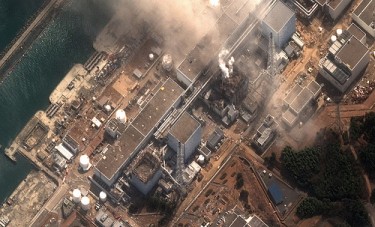This post is part of our special coverage Japan Earthquake 2011.
An antinuclear power poster designed by Makoto Wada, a Japanese illustrator, has triggered arguments on the multifaceted impact of visual art.
On March 11, 2011, the largest earthquake in the history struck Japan, and the resulting tsunami irreversibly damaged Fukushima Daiichi Nuclear Power Plant. In the course of stabilizing the plant, a large amount of radioactive materials were spread over nearby areas.
The poster depicts a mother and a boy near a nuclear power plant (a high quality image of the poster can be seen on the official site). Yellow particles with creepy faces are falling from the dark sky, and the mother is hugging the boy tightly to protect him from the harm.

Earthquake and tsunami damaged-Fukushima Dai Ichi Power Plant, Japan by DigitalGlobe-Imagery, on Flickr (CC BY-NC-ND 2.0).
It was originally drawn for Antinuclear Poster Exhibition [ja] held in Tokyo for 10 days in November 2011. Many creators took part in this project: 228 posters from Japan and 13 posters from overseas were displayed.
This particular poster attracted attention of Twitter users when kenaday uploaded the image to Twitpic. The overall tone of the comments on the Twitpic page is favorable.
Chiyuky expresses [ja] her gratitude:
「和田誠さんの反原発ポスター」素晴らしい。この1枚は私の背中をおしてくれた。ありがとうございます。
deepoperation testifies [ja] that the image portrays the feeling of people in Fukushima:
私は3/16まで原発45km地点に残ることを余儀なくされたが、続く水素爆発、がなる市の宣伝カー、降雨、フォールアウト、鳴り止まぬ電話、この絵は個人では如何とも対応し難い当時の心境を端的に物語ってくれる。
However, as the image started to circulate the web, netizens start to develop a feeling of discomfort. phoque thinks the motif is clichéd [ja]:
和田誠という人は日本を代表するグラフィックデザイナーで、生きるレジェンドみたいな偉人なんですが、であると同時に現役バリバリの第一線の人でもある。その人のポスター。
いい絵だと思いますよ。実際、自分の部屋に貼りたいくらい。もしこれが反原発のポスターでないのなら。降っているのが雪ならば。
だけど、これが反原発なり脱原発なりのプロパガンダとして描かれたものだとしたならば話は別です。あまりにも陳腐ではないですか、これ。
幼子を守る母の姿、っていうのは古今東西描き継がれたテーマですが、それは人間の根幹にかかわることなので、「使い古された」とか「手垢がついた」とかそういう意味で「陳腐」なのではありません。
反原発だか脱原発だかを描くのに「幼子を守る母の姿とそこへ降り注ぐ死の灰」っていうモチーフを持ってくるのは、正直な話、扇情的に過ぎるというか安直すぎるというか、和田センセ、なんかずいぶん手近なところに飛びついてやっつけで仕事しちゃったんじゃないか、みたいに感じたのです。そして、そういう扇情的で安直なモチーフを持ってきたというところに、和田センセの反原発というか脱原発に対する理解の浅さが、図らずも露呈しちゃったってことではないのかと。
Makoto Wada is one of Japan's most renowned graphic designers. He is a living legend, while still very active in the field. This is his poster.I think this is a good picture, really. I would even put it on the wall of my room, only if it were not an antinuclear poster and the objects falling down were snow.
However, if this was drawn as propaganda for ideologies such as antinuclear and denuclearization, that's a different story. This is too cliched, isn't it?
A mother protecting her child is a subject drawn by people of all ages and cultures, but I'm not saying that it's cliched in the sense that it's overused. The subject portrays the essence of humanity.
Using the motif of “the figure of a mother protecting a little child with dead ash falling down” for depicting something like antinuclear or denuclearization is, honestly, sort of too sensational or too easy. I felt like “You took up a subject nigh at hand and did a rush job, didn't you, Mr. Wada?”. I guess the fact he has chosen such a sensational and easy motif unwittingly reveals how shallow his understanding of something like antinuclear or denuclearization is.
yotayotaahiru suggests [ja] the symbol of a powerless mother may have a negative effect:
たった一人で我が子を抱いてうずくまる母の図はあまりにも無力だ。そして、この表現そのままの状況にある人もきっといらっしゃる。支援が必要なのは大前提なのだけど、「被害者の象徴」のようになってしまうと、当事者の内包する力を奪ってしまいかねない。
Kenichi Sakamoto is also concerned [ja] about the evocative nature of the poster:
和田誠の反原発ポスターを見た。原発周辺で放射能が母子に降りかかっている図柄で印象的。でも、この絵で福島のお母さん達はどれほど不必要に恐い思いをするんだろう。原発については科学的に議論すべきで、こういった叙情的手段での世論喚起は不要だろう。http://twitpic.com/8epyct
He then describes the reaction [ja] of an acquaintance in Fukushima:
福島の知り合いは小さなお子さんを持つお母さん。避難しなければならない区域ではありませんし、仕事を辞めて福島を離れるわけにはいきません。様々な情報が飛び交う中で不安を抱えて生活していましたが、それでも気丈に頑張っていました。その彼女から急に取り乱した声の電話が入りました(続く)
よくよく聞くと、あの絵を見てパニックを起こしてしまったとのこと。積もりに積もっていた不安が底知れない恐怖として一気に吹き出してしまったようです。見た方は分かると思いますが、あの絵「反原発の聖母子像」は傑作です。人の心を揺り動かさずにはおかないインパクトがある(続く)
This post is part of our special coverage Japan Earthquake 2011.







1 comment